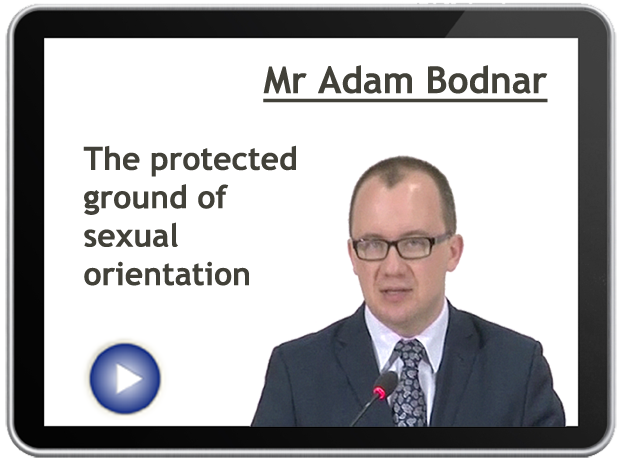Module 5:
The protected grounds of sexual orientation
This module examines the protection from discrimination on the grounds of sexual orientation.
An overview of the issues raised in this module is provided by Mr Adam Bodnar which highlights key issues relating discrimination on grounds of race, religion or belief and sexual orientation.

Under the Framework Directive, sexual orientation discrimination is only prohibited in relation to employment, occupations, vocational training and related fields. Unlike racial discrimination, sexual orientation discrimination is not prohibited in the provision of goods and services, education and housing. However, it is important to note that many Member States have gone beyond the minimum requirements of the Framework Directive in their national laws.
It is also important to note that the Framework Directive states that it is without prejudice to national laws on marital status and the benefits dependent on such status (recital 22). This means that the Directive does not affect the national laws of Member States as to whether gay men or women can marry or form some other partnership similar to marriage. This has implications for the types of the cases that have been before the CJEU in relation to sexual orientation (see below).
There is no definition of sexual orientation in the Framework Directive. However, in general terms it means a personís sexual orientation towards:
- persons of the same sex (that is, the person is a gay man or a lesbian);
- persons of the opposite sex (that is, the person is heterosexual); or
- persons of either sex (that is, the person is bisexual).
Discrimination on grounds of sexual orientation would cover all types of sexual orientation. Gender reassignment discrimination is not the same as sexual orientation discrimination and is covered separately by the Gender Directives.
There is also a relationship between the sexual orientation provisions of the Framework Directive and Articles 8 and 14 of the European Convention of Human Rights. Article 8 provides a right to privacy and a right to family life. Both of these rights apply in relation to sexual orientation.
The right to privacy and family life, can be limited, but only where it is necessary to do so, for example to protect the rights of others, national security or to prevent crime. Article 14 provides for the right to be free from discrimination in the enjoyment of the rights in the ECHR, and this includes discrimination on grounds of sexual orientation. There have been a number of cases before the European Court of Human Rights that have examined issues relating to these rights and sexual orientation.
Sexual orientation discrimination cases under the Framework Directive apply not only in relation to the way in which a person is treated in a work environment because of their sexual orientation, but also to the benefits and pensions linked to employment.
The two cases to date before the CJEU to consider sexual orientation discrimination have both involved pensions.